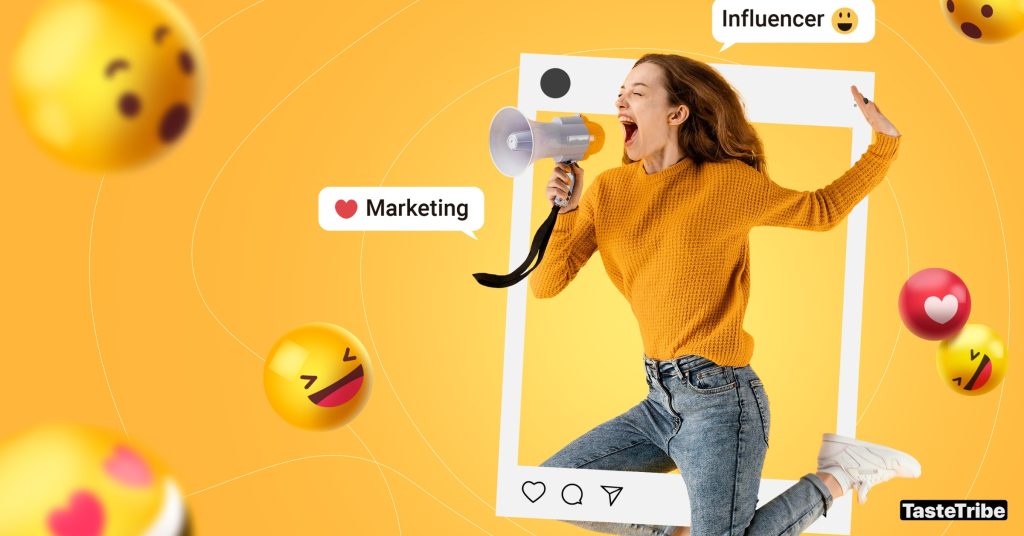
In the fast-paced digital age, restaurants face intense competition not only within their neighborhoods but also online. Traditional marketing strategies, while still useful, are often expensive and sometimes lack the authenticity and personal touch that modern consumers crave. Enter influencer marketing—a cost-effective, engaging, and highly impactful way for restaurants to reach new customers and build lasting relationships.
Influencer marketing, particularly through social media platforms, can outperform traditional marketing methods in many cases. With influencers holding sway over large and niche audiences alike, restaurants that harness this marketing strategy can enhance their visibility and credibility. In this blog, we will explore the many benefits of influencer marketing for restaurants and why it’s becoming a preferred choice for many in the industry.
1. Authenticity and Trust: Building Credibility Through Influence
Why Authenticity Matters
One of the key advantages of influencer marketing is its authenticity. Traditional advertising often feels impersonal, and consumers are becoming more skeptical of brand-driven messages. Influencers, on the other hand, have already established trust and credibility with their followers. When influencers share their dining experiences, recommend restaurants, or review menu items, their endorsements feel more personal and genuine.
Influencer marketing relies on the influencer’s ability to communicate sincerely with their audience, creating a sense of trust and relatability. Unlike traditional advertisements, which are often seen as sales-driven, influencer marketing taps into genuine experiences, which resonate more with consumers.
The Power of Word-of-Mouth
Word-of-mouth recommendations are one of the most effective forms of marketing, and influencer marketing builds on this concept by amplifying it across social media platforms. People tend to trust recommendations from individuals they admire or relate to, which is why influencer marketing is so powerful. An influencer’s followers are more likely to believe in the restaurant’s quality when it comes from a trusted source.
In this way, influencer marketing replicates the word-of-mouth effect on a larger, digital scale, often resulting in higher engagement and stronger connections with potential customers. This level of trust is hard to replicate through traditional advertising methods like TV commercials or print ads.
2. Targeted Audience Reach: Connecting with the Right Demographic
Reaching a Specific Audience
Another major benefit of influencer marketing is the ability to reach a highly targeted audience. Influencers typically have well-defined niches, whether it’s foodies, fitness enthusiasts, or travel lovers. For restaurants, partnering with food bloggers, local lifestyle influencers, or health-conscious influencers can help them connect with the exact demographic they want to attract.
Traditional marketing, like billboards or TV ads, can be expensive and lacks the precision of influencer marketing. You may pay for billboard space or radio ads but can’t always guarantee that the people seeing or hearing your message are part of your target audience. With influencer marketing, you can choose influencers whose followers align with your restaurant’s demographic, ensuring your marketing dollars are spent more efficiently.
Leveraging Niche Audiences for Better Engagement
For example, if your restaurant specializes in plant-based meals, partnering with vegan influencers who focus on healthy living or sustainable food choices ensures that your message reaches people who are already interested in your offerings. This targeted approach not only enhances the effectiveness of the marketing campaign but also increases the likelihood of engagement and conversions.
By working with influencers who resonate with specific lifestyle choices or culinary preferences, restaurants can tap into audiences that are already primed to become loyal customers.
3. Cost-Effective Marketing: Maximizing ROI on a Budget

Affordable Marketing for Small Restaurants
Compared to traditional advertising, influencer marketing is often more budget-friendly. Television, radio, and print ads can be expensive, especially for small or medium-sized restaurants. In contrast, working with micro-influencers (influencers with smaller but highly engaged followings) can be very affordable, and in some cases, influencers may even accept a complimentary meal in exchange for a review or social media post.
Scalable Marketing Strategies
For restaurants with a limited marketing budget, influencer marketing allows for more flexibility. Even partnering with a few micro-influencers in your local area can create significant buzz without breaking the bank. Micro-influencers may not have massive followings, but they often boast higher engagement rates because of their closer connection to their audience. These influencers provide an excellent return on investment (ROI) as they generate authentic engagement while maintaining lower costs.
This scalability makes influencer marketing an ideal option for businesses of all sizes. Larger restaurants can work with prominent influencers, while smaller eateries can opt for micro-influencers to create equally effective campaigns.
4. Visual Appeal and Storytelling: Bringing Your Restaurant to Life
The Power of Visual Content
The modern food industry thrives on visual content. Platforms like Instagram and TikTok are built for sharing eye-catching images and videos of food, making them perfect for restaurants looking to showcase their dishes. Influencers excel at creating visually appealing content that tells a story about the dining experience.
Influencers often present dishes in a way that is both aesthetically pleasing and relatable, using their photography or videography skills to highlight the textures, colors, and ambiance of your restaurant. Whether it’s a beautifully plated dish, a behind-the-scenes look at the kitchen, or a candid reaction shot from the influencer enjoying the food, these moments offer more than just advertising—they tell a compelling story.
Storytelling Beyond Taste
Restaurants aren’t just about food; they’re about the experience, ambiance, and atmosphere. Influencers help capture this holistic experience, allowing potential customers to visualize what it’s like to dine at your restaurant. Through this storytelling approach, influencers can communicate the essence of your brand, helping to establish an emotional connection with potential customers.
When followers see an influencer they admire enjoying a meal at your restaurant, they imagine themselves in that situation, creating a desire to visit and experience it firsthand.
5. Enhanced Engagement: Encouraging Two-Way Interaction
Creating Conversations Around Your Brand
Influencer marketing encourages higher levels of engagement compared to traditional marketing. Social media platforms foster two-way communication, allowing customers to interact with the content, ask questions, and share their experiences. When an influencer posts about a restaurant, it often leads to conversations in the comments, with followers asking about menu recommendations, prices, or the overall experience.
This type of engagement builds a sense of community around your brand. Customers not only engage with the influencer’s post but often engage with the restaurant directly by tagging it in their own posts or leaving reviews.
Long-Term Engagement
Unlike traditional advertising where the interaction ends after a commercial or billboard is seen, social media posts stay active, allowing people to continue engaging with the content long after it’s posted. This ongoing interaction keeps the restaurant top-of-mind for potential customers. Every like, comment, and share extends the reach of the content, boosting visibility and generating even more engagement over time.
6. Content Repurposing: Maximizing Your Marketing Efforts

Repurposing Influencer Content for Your Channels
Another often overlooked benefit of influencer marketing is the ability to repurpose the content created by influencers. The photos, videos, and reviews that influencers produce can be shared on the restaurant’s own social media channels, website, or even in email newsletters. This provides fresh, authentic content without the need for an in-house marketing team to create everything from scratch.
Building a Content Library
Restaurants can use this content to build a portfolio of positive reviews and user-generated content, which further boosts credibility and social proof. Having a content library of influencer posts also ensures that you always have something to share with your audience, keeping your social media feeds active and engaging.
Repurposing influencer content extends its value and reach, turning a single post into a long-term asset for your restaurant’s digital presence.
Read More: 9 Tips for Harnessing Instagram Reels for Restaurant Marketing
7. Builds Long-Term Relationships: Turning Influencers into Brand Ambassadors
Beyond One-Off Collaborations
Influencer marketing is not just about one-off posts; it’s about building lasting relationships with influencers who genuinely love your brand. When a restaurant establishes strong relationships with influencers, they become brand advocates who continue to promote the business over time.
These long-term collaborations create deeper loyalty from both influencers and their followers. Influencers who regularly visit your restaurant or collaborate with your brand frequently become recognizable faces to their followers, building familiarity and reinforcing your brand over time.
Turning Influencers into Advocates
Influencers who develop a personal connection with your restaurant are more likely to continue recommending it, even when they’re not being paid for a specific post. These genuine recommendations are often the most impactful because they come from a place of authenticity.
Unlike traditional advertising campaigns that run for a limited time, influencer relationships provide ongoing promotion, helping to keep your restaurant relevant in the ever-changing digital landscape.
8. Measurable Results: Tracking ROI and Campaign Success
Data-Driven Insights
One of the greatest advantages of digital marketing, including influencer marketing, is the ability to track and measure results. Traditional marketing channels like TV or print can make it difficult to accurately assess the return on investment (ROI). However, with influencer marketing, restaurants can easily measure engagement metrics like likes, comments, shares, and even direct conversions.
Tracking Conversions and Success
For example, if an influencer shares a unique discount code or promotional offer, restaurants can track how many customers redeemed it, giving them clear insights into the campaign’s effectiveness. This data-driven approach allows restaurants to refine their marketing strategies, work with the influencers who deliver the best results, and adjust their campaigns for maximum impact.
The ability to measure success ensures that restaurants get the most out of their influencer marketing investments, refining their strategies over time based on real-world results.
9. Local Influence for Community Engagement: Strengthening Ties with the Community
Hyperlocal Focus
For restaurants, especially local ones, community engagement is vital. Partnering with local influencers allows restaurants to tap into their community’s pulse and build stronger connections with the people who live nearby. Local influencers often have a highly engaged audience in a specific geographic area, which is perfect for restaurants looking to attract nearby customers.
Driving Foot Traffic with Local Influencers
Instead of broad, untargeted marketing efforts, local influencers can help bring in customers who are more likely to visit regularly. These influencers also tend to have more personal relationships with their followers, adding another layer of trust and credibility to the recommendations.
Local influencers can attend restaurant events, promote new menu items, or simply recommend your restaurant to their local followers, all of which drive foot traffic and build long-term community engagement.
Conclusion: The Future of Influencer Marketing for Restaurants
Influencer marketing offers restaurants a unique and powerful way to reach new customers, build trust, and engage with their audience. By partnering with influencers who align with their brand values and target market, restaurants can create authentic, visually appealing content that resonates with today’s digitally savvy consumers. Compared to traditional marketing methods, influencer marketing is often more cost-effective, more targeted, and more engaging.
As consumer preferences continue to shift toward experiences that feel personal and relatable, influencer marketing will likely remain one of the most effective strategies for restaurants looking to grow their brand and connect with their audience. Whether through eye-catching food photos, engaging storytelling, or local partnerships, influencer marketing provides endless opportunities to boost visibility, enhance credibility, and build lasting customer relationships.
Ready To Connect With Foodie Influencers?